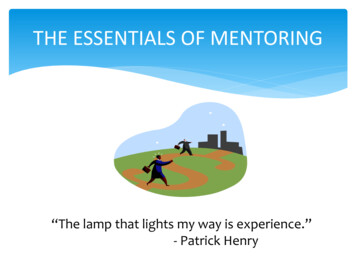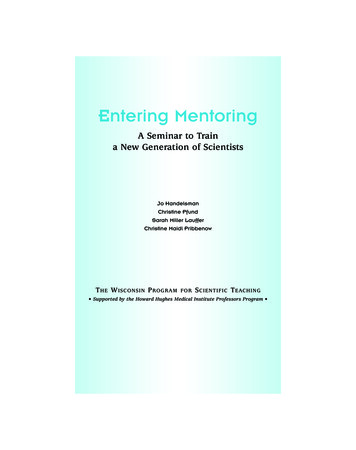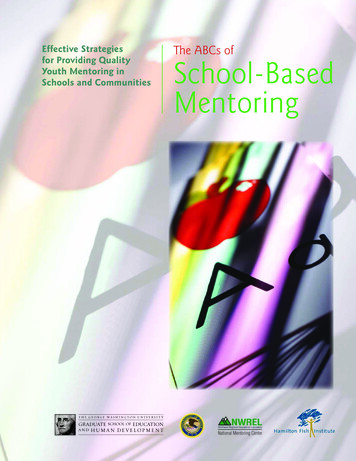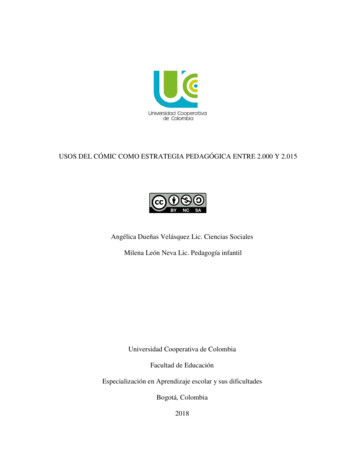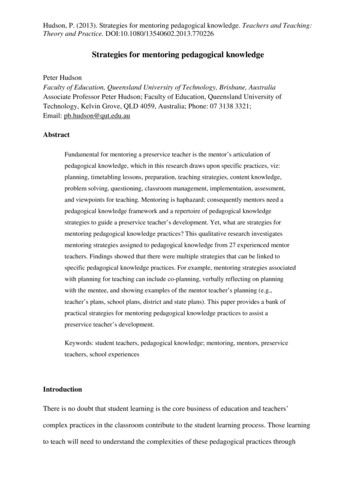
Transcription
Hudson, P. (2013). Strategies for mentoring pedagogical knowledge. Teachers and Teaching:Theory and Practice. DOI:10.1080/13540602.2013.770226Strategies for mentoring pedagogical knowledgePeter HudsonFaculty of Education, Queensland University of Technology, Brisbane, AustraliaAssociate Professor Peter Hudson; Faculty of Education, Queensland University ofTechnology, Kelvin Grove, QLD 4059, Australia; Phone: 07 3138 3321;Email: pb.hudson@qut.edu.auAbstractFundamental for mentoring a preservice teacher is the mentor’s articulation ofpedagogical knowledge, which in this research draws upon specific practices, viz:planning, timetabling lessons, preparation, teaching strategies, content knowledge,problem solving, questioning, classroom management, implementation, assessment,and viewpoints for teaching. Mentoring is haphazard; consequently mentors need apedagogical knowledge framework and a repertoire of pedagogical knowledgestrategies to guide a preservice teacher’s development. Yet, what are strategies formentoring pedagogical knowledge practices? This qualitative research investigatesmentoring strategies assigned to pedagogical knowledge from 27 experienced mentorteachers. Findings showed that there were multiple strategies that can be linked tospecific pedagogical knowledge practices. For example, mentoring strategies associatedwith planning for teaching can include co-planning, verbally reflecting on planningwith the mentee, and showing examples of the mentor teacher’s planning (e.g.,teacher’s plans, school plans, district and state plans). This paper provides a bank ofpractical strategies for mentoring pedagogical knowledge practices to assist apreservice teacher’s development.Keywords: student teachers, pedagogical knowledge; mentoring, mentors, preserviceteachers, school experiencesIntroductionThere is no doubt that student learning is the core business of education and teachers’complex practices in the classroom contribute to the student learning process. Those learningto teach will need to understand the complexities of these pedagogical practices through
guided discovery of teaching and learning with strong focuses on what constitute effectiveteaching practices. Combining the mentor teachers’ knowledge of teaching practice with theknowledge of effective mentoring can provide preservice teachers (mentees) with valuabledirections for advancing their pedagogical development. Yet mentoring can be haphazard andmentors need to develop pedagogical knowledge practices to assist them in their roles(Hudson, 2010). This paper presents experienced mentors’ strategies for mentoringpedagogical knowledge practices. Pedagogical knowledge practices will be presented as thetheoretical framework, followed by an outline of the haphazard nature of mentoring thesepractices, as a rationale for investigating this current study.Effective mentoring is considered a way to build capacity in the teaching profession(Hobson, Ashby, Malderez, & Tomlinson, 2009; Parker, 2010) with widespread acceptanceand considerable research in the field (e.g., see the journal: Mentoring & Tutoring:Partnership in Learning). However, to achieve success in mentoring requires meeting theconditions for effective mentoring, which Hobson et al. outline as: “(i) contextual support formentoring; (ii) mentor selection and pairing; (iii) mentoring strategies; and (iv) mentorpreparation” (p. 211). Considering that mentoring is largely variable and can “have thepotential to do harm” (Hobson et al., 2009, p. 214), providing mentors with a well-designedmentoring program can assist in facilitating a more effective mentoring process (see Hudson& McRobbie, 2004, for a control-experiment investigation on mentors using a pre-designedmentoring program).Studies have shown the inequities in mentoring, for example, Kardos and Johnson(2010) investigated 374 beginning teachers’ mentoring experiences in their first two years ofteaching with results that showed 91% of beginning teachers from high-income schools wereallocated an official mentor compared with 65% in low-income schools; however their studydid not determine the quality of mentoring received. Consequently, educators argue the need2
to have induction and mentoring, with a rationale “.to facilitate their induction into theculture of the profession” and to have a “.focus on the mentee’s ability to facilitate learning”(Hobson et al., 2009, p. 207). Indeed, there are numerous calls and recommendations forschools to provide “a carefully constructed high quality mentoring program” (Marable &Raimondi, 2007, p. 35) and that such programs need to be implemented over time (PiggotIrvine, Aitken, Ritchie, Ferguson, & McGrath, 2009). Rajuan, Beijaard, and Verloop (2008)claim that “what student teachers learn about teaching practice from their cooperatingteachers remains an unanswered question” (p. 131); hence well constructed mentoringprograms can present explicit practices for ensuring preservice teachers receive qualitymentoring and a way for them to articulate their learning to teach through a commondiscourse (Murray, Hudson, & Hudson, 2011). Others, such as Sharplin, O’Neill, andChapman (2011), recommend timely “intervention for retention” at crisis points during thebeginning teacher’s first years (p. 136), which is applicable to preservice teachers. At thesame time, early-career teachers need to be “open to critiques and suggestions and theyshould have sufficient self reflective, metacognitive skills to process, contemplate, and usethe information provided” (Roehrig, Bohn, Turner, & Pressley, 2008, p. 700).Pedagogical knowledgeShulman presents a particular view of the term “pedagogical knowledge” as a “concern forreinstating content as a critical facet of teacher knowledge” (as cited in Morine-Dershimer &Kent, 1999, p. 21). Consequently, he coined the term “pedagogical content knowledge”(PCK) as a way of “representing and formulating the subject that makes it comprehensible forothers” (Shulman, 1986, p. 9). Content knowledge is central to PCK as it is based on “topicspecific knowledge for teaching a particular subject” (Abell, 2008, p. 1413). The general termpedagogical knowledge is used frequently when referring to the knowledge for teaching (e.g.,Briscoe & Peters, 1997; Coates, Vause, Jarvis, & McKeon, 1998). Such pedagogical3
knowledge, which is presented in university coursework and further developed within theschool setting (e.g., Allsop & Benson, 1996; Hulshof & Verloop, 1994) is critical topreservice teachers’ attainment of effective teaching practices (Hudson, 2007). However, asinferred by Shulman (2000, 2004), wisdom of practice extends beyond the theory ofpedagogical knowledge to practical connectivity, where pedagogical knowledge is trialledand evaluated in the field towards attaining mastery experiences (see also Bandura, 1977).Classroom teachers, in their roles as mentors, can have the wisdom from teaching todeconstruct and articulate particular, and tacit, pedagogical knowledge to guide the mentees’practices. This is especially important as preservice teachers spend as much as 20% of a fouryear Bachelor of Education degree in the school setting and higher percentages in othertertiary education courses, for instance, in England about two-thirds of a postgraduatecoursework for preservice teachers involves professional school experiences (e.g., practicumand internship; Hobson et al., 2006; Hobson et al., 2009). Thus, mentoring becomes pivotalfor developing preservice teachers’ pedagogical practices in schools; yet this mentoring ishaphazard (Hudson, 2007). A conclusion drawn in one study involving 14 mentors (Hudson& Hudson, 2011a) suggested that educational research uncover strategies associated withmentoring pedagogical knowledge practices to assist mentors in their roles. Figure 1 outlinespedagogical practices for teaching in the classroom and will be summarised in the followingthree paragraphs as the framework for this study (see Hudson, 2004, 2007, 2010).[Figure 1 near here]Theoretical framework: Pedagogical practicesEffective teachers aim to meet their education system requirements and ensure teaching ispurposeful and transparent through their teaching plans. Although experienced teachersdevise curriculum programs focused on the presiding syllabus, preservice teachers, in their4
formative stages of development, are required to produce lesson plans to indicate the teachingintent, lesson direction (e.g., activities, teaching strategies, assessment), and management ofthe learning environment. Effective mentor teachers are considered experienced in planningfor teaching (Jarvis, McKeon, Coates, & Vause, 2001), which also entails timetabling andscheduling of lessons, and can provide further insights into how their schools devise teachingplans. In the primary school, such timetabling would include determining when in the schoolweek the various subjects are taught, as this is generally a professional judgement. Forsecondary schools it involves scheduling when to teach particular content during the schoolterm.Effective teachers are well prepared with plans, resources, and knowledge of what,when and how to prepare for teaching (Tankersley, 2010; Williams, 1993). Different lessonscan require different preparation, particularly with the range of subjects taught by a teacher inthe primary school, and such preparation may not be apparent to a preservice teacher withoutexplicit questioning or explanations from the mentor. The use of teaching strategies allowsthe teacher to structure learning environments appropriate to the age, level, type of lesson,and content knowledge (Bernard, 1989; Lingard et al., 2001). Content knowledge is crucialfor teaching any particular subject matter in the classroom (Ball, Thames, & Phelps, 2008)and a teacher’s content knowledge can be a predictor of student achievement (Hill, Rowan, &Ball, 2005), consequently, the importance of a preservice teacher having content knowledgebefore teaching cannot be undervalued. Indeed, an effective mentor teacher can articulate tothe preservice teacher applicable content knowledge for a lesson and where they sourced thiscontent knowledge. Regardless of the subject area, a key aspect of mentoring is ensuring thepreservice teacher has proficient content knowledge for teaching a lesson (Perry, Hutchinson,& Thauberger, 2007). Checking the mentee’s content knowledge before teaching may alsoavert learning inaccuracies for which mentors and university advisers need to take dual5
responsibility (Youens & McCarthy, 2007).Problems can arise in any lesson, including resource and student management, whichrequires “thinking on one’s feet”, that is, problem solving in action. Problem solving alignswith Schön’s (1983, 1987) reflection-in-action with the notion that changes are made when inthe process of teaching that aim to facilitate more effective learning. Furthermore, classroommanagement can be a priority issue for preservice teachers (Bates, Ramirez, & Drits, 2009;Burton, Weston, & Kowalski, 2009), consequently, the mentor’s knowledge of the students,existing values and attitudes with rules and procedures, and understandings about specificstudents’ needs and the wider socio-cultural contexts can be used to guide the preserviceteacher’s development of classroom management.Teachers guide their students’ learning through astute questioning that considers thestudents’ learning levels and needs (Carr, 1998; Tobin, 1987; Wragg & Brown, 2001). Thementor’s knowledge of how to structure a lesson (e.g., stimulating introduction to the topic,the body of the lesson presents a hands-on activity, and the lesson conclusion capitalises ondetermining student learning of the topic through verbal, written, pictorial or other forms ofcommunication) also considers the student context to assist the mentee’s teaching. Learningmust be assessed to determine students’ new understandings from what was taught (Corcoran& Andrew, 1988; Jarvis et al., 2001). An effective mentor will show how pedagogicalknowledge practices are interconnected, including assessments for teaching and learning(e.g., Palmer, 1998; Tankersley, 2010). Finally, every mentor has experiential viewpointsabout teaching that can add value to the mentee’s learning experiences (Hobson et al., 2009).These viewpoints can include personal teaching philosophies that underscore the teacher’spractices; hence sharing viewpoints about teaching can provide mentees with insights intopedagogical practices unique to particular contexts. It should be noted that differentiating the6
curriculum and addressing students’ needs (e.g., Leavitt, 2007) underpins the pedagogicalknowledge practices outlined in Figure 1.Although many preservice teachers claim their mentoring was random and haphazard(Hudson, 2004, 2007), mentors also report that the mentoring they provide is variable. Forexample, data collected from mentors in a study by Hudson (2010) and displayed in Table 1illustrates how mentors evaluated their mentoring of pedagogical knowledge to preserviceteachers for teaching primary science and primary mathematics. In particular, mentoringclassroom management appeared as the most frequently mentored practice in each subjectarea while mentoring content knowledge, problem solving and viewpoints occurred leastfrequently. Interestingly in Table 1, mentors agreed that mentees received more mentoring inmathematics than science, probably because mathematics has more teaching time allocatedwithin the weekly timetable in the primary school.The haphazard nature of mentoring (Table 1), emphasises the need for mentors to beprovided with practical strategies that can guide their mentoring of pedagogical knowledge.Thus, the research question for this study is: What are strategies for mentoring pedagogicalknowledge practices?[Table 1 near here]Data collection methods and analysisThis qualitative research was conducted at a Queensland university, where twenty-sevenmentor teachers were involved in a professional development program titled “Mentoring forEffective Teaching (MET)”. This program emerged from an Australian Federal Governmentgrant titled “Teacher Education Done Differently (TEDD)”, which focused on linkinguniversity theory to school-based experiences for preservice teachers to conceptualise theorypractice connections (see Hudson & Hudson, 2011b) Participants were engaged in the three-7
day MET program facilitated by the author and another academic staff member. Participantswere involved in social discourse around a range of topics, such as: (1) Mentoring and thementor-mentee relationship, (2) School culture and infrastructure, (3) Hudson’s mentoringmodel (i.e., personal attributes, system requirements, pedagogical knowledge, modelling, andfeedback; Hudson, 2010), (4) Problem solving, and (5) Action research for enhancingmentoring and leadership practices. Each topic was presented through interactive activitiesthat utilised teaching strategies to maximise participation. For instance, participants usedwhiteboard markers to brainstorm strategies on laminated A3 diagrams of pedagogicalknowledge practices (see Figure 1). In addition, they were provided with individual responsesheets related to the pedagogical knowledge practices.There were 26 females and 1 male with 18 of them aged between 30-49 years and 5older than 50 years of age. Only 3 were between 22-29 years of age. All had mentored morethan one preservice teacher previously with 24 who indicated they had mentored more than 5mentees with some more than 20 mentees. Six participants had been employed in teachingbetween 6-10 years and 20 participants had worked in the education system for more than 10years. There was one participant only who had worked in the education system for less than 6years. These participants were taken through the MET program with an expectation that theywill facilitate this program in their own schools, as a train-the-trainer model. As a result ofthis study, subsequent MET programs were condensed to two days for school implementationwith considerable success (Hudson & Hudson, 2011b).In particular, this research study aimed to investigate mentors’ strategies that can beused to facilitate pedagogical knowledge in the mentee. The session involving pedagogicalknowledge occurred on the first day of the MET program and lasted approximately 70minutes. The researcher facilitated the data collection process so it was important to reduceresearcher bias by having another academic and the research assistant present. Audio data8
were collected from whole group and smaller group (i.e., 4-6 participants) discussions onpedagogical knowledge using digital recorders set up by a research assistant who had a PhD.These recorded dialogues were transcribed (by the research assistant) and analysed fordiscourse relating to communicating pedagogical practices to mentees. In addition,participants collaborated in small groups to write strategies on laminated materials, whichalso facilitated discussions on the pedagogical knowledge practices (see Figure 1). All writtenmaterials were transcribed and collated within the aforementioned pedagogical knowledgepractices. The university ethics committee and state department of education providedapproval for this study, and informed consent was gathered from principals of schools and theparticipants involved in the study. The analysis of data occurred within the previously statedpedagogical knowledge practices, where responses were used to present strategies formentoring and as the data collection concluded with a whole group discussion, a summaryconsensus of the mentoring strategies was included at the end of each pedagogical knowledgepractice. Participants were provided with opportunities to consider strategies for otherpedagogical knowledge practices for teaching in the classroom that may exist outside thisframework.ResultsThe strategies articulated by the study participants for mentoring pedagogical knowledge topreservice teachers during their professional school experiences will be discussed in turnfollowing the theoretical framework outlined earlier.Planning for teachingThese mentors suggested various strategies for mentoring about how to plan for teaching. Itwas articulated clearly that mentors need to “show the preservice teacher examples of thementor’s [teacher’s] planning” with consideration of the “different yet equally important tiers9
of planning” (e.g., teacher’s plans, school plans, district, state, and national plans). It wasdeemed important to explain “how to integrate key learning areas effectively and efficiently”,linking “curriculum documents and longer term visions” with ways to sequence and timelessons. Although “different teachers have different approaches”, these mentors agreed thatan effective mentor “builds in opportunities for cooperative planning with the preserviceteacher” around “meaningful non-superficial learning experiences”. One mentor suggested“providing the preservice teacher with a planning template”, while several mentors presentedthe need for making “timetabling decisions explicit and transparent” in the planning.Furthermore, it was highlighted that the mentor can seize opportunities to “reflect withpreservice teachers on success of their planning in relation to their lesson delivery”. Indeed,there was consensus that the mentor and mentee should “plan cooperatively and reflecttogether afterwards”. Other strategies included planning for differentiated learning withconsideration of student contexts, mentors’ modelling and articulation of planning, andallowing the mentee to experience planning. Specifically, it was outlined that mentors canassist by discussing school, state and national curricula, their planning methods, and guidingthe mentee’s development through collaborative planning. It was noted that preserviceteachers need to take responsibility for their learning (see also Perry, Hutchinson, &Thauberger, 2008), particularly as many documents are now readily available online.Timetabling (scheduling) teachingTimetabling and scheduling of lessons was noted in relation to “syllabus expectations” withthe “required hours of teaching of key learning areas”. One mentor suggested havingdiscussions with the mentee and making “explicit the theory behind timetabling of dailyactivities [for example] to utilise teacher aids, transitions, sugar levels and snack breaks, anddevelopmental considerations, e.g. younger children fatigue and concentration” (arrow10
included). Timetabling issues around “playground duty rosters” and “outlining expectationsthat preservice teachers attend duties to develop relationships with students, staff, etc” wereidentified as important. Yet it was noted that school environments have other activities thatmay interfere with the timetabling and so mentees need an “awareness of impacts on theclassroom timetable”. Timetabling lessons needs to be linked carefully with planningstructures and as such lessons can be divided into allocated times, hence, “understanding thateach lesson has an intro/body/conclusion and activities can be structured for each timeframe”. Discussions as a whole group concluded that mentors can assist their mentees by:outlining that timetabling necessitates knowledge about syllabus requirements for allocatedteaching durations; presenting the theory behind timetabling subjects (in the morning,afternoon or particular times during the week); and, explaining the impacts of extra-curriculaactivities on the weekly timetable.Preparation for teachingThese experienced mentors strategised on how to mentor about preparing for teaching. Theyexplained that research about the teaching topic, modelling of preparation for teaching, andproviding examples of teaching preparation were considered effective strategies. It wasconsidered important that mentors “provide them [mentees] with a realisation thatorganisation is the key”. It was outlined that mentors need to “ensure preservice teachers areaware of resource locations, ordering supplies, have access to photocopying machine, etc”and “stress being flexible with prep materials, right tool for the right task”. It was alsoemphasised that lesson plans should reflect preparation outlines, with a responsibility todevelop plans in advance for ensuring preparation of resources yet “lesson plans must beflexible”. These mentors emphasised that mentees need to know the “context”, “what you areteaching”, and “the strengths and weaknesses of the students”. These mentors suggested that11
it takes a community of mentors to develop a preservice teacher’s practices, and they willrequire “samples of good practice in terms of planning and preparation from a variety ofstaff”. In summary, the mentors concluded in the group discussion that they can assist thementee to select teaching strategies that include consideration of resources for differentiatedlearning, showing where resources are located, and discussing the need to manage and beflexible with resources.Teaching strategiesFocused group discussions outlined the need to be current with teaching strategies,particularly as research about teaching strategies presents strategies that are effective forspecific contexts. Indeed, these experienced mentors presented a plethora of teachingstrategies from “productive pedagogies” (see Lingard et al., 2001), cooperative groupingstrategies (Bernard, 1989), and the use of specific resources to facilitate teaching (e.g.,Information Communication Technology). It was explained that mentors need to “modelstrategies and articulate to the mentee what strategy is being used, why it is being used andother contexts to use it in” with discussion about “tacit/subconscious strategies withpreservice teachers for variability, inclusion, task expectations, transitions, language, etc”.Once more, the notion of drawing upon a community of mentors was emphasised, wherementors can “allow preservice teachers to work with and observe a variety of differentteachers”. Through the learning process, it was highlighted that mentees must experienceteaching using a variety of strategies and be “encouraged to take risks, to try new strategies ina safe environment”. It was explained to the whole group that mentors can assist theirmentees to select teaching strategies by discussing student contexts and their needs,modelling the varied uses of teaching strategies, and allowing mentees opportunities to testout a range of teaching strategies.12
Content knowledgeDuring the focus-group discussions, mentors were adamant about “staying up to date withpersonal content knowledge” through “careful consideration of the content explicitlyidentified in syllabus documents”, “access to a resource person within a school” and“evaluating websites for credibility; Is the content correct and up to date?” They clearlyemphasised the need for mentees to “ensure content is relevant to interest, experiences, etc. ofstudents” and that it “caters for a variety of learning styles to acquire/access content”. Indeed,a teacher’s content knowledge may well be a predictor of student achievement (Ball et al.,2008). It was stated that, when time allowed, mentors could “encourage preservice teachers todemonstrate practical activities before they have to teach [the students] and to rehearseexplanations that could be confusing”. These mentors agreed that they can share their contentknowledge with mentees prior to teaching lessons, however, they also highlighted a “shift inthinking that teachers having to be the source of all knowledge, shift to knowinghow/where/who to access knowledge”. So it was argued that mentees can “be responsible fortheir own learning, fill the gaps” by “reading widely” and “researching” though mentors alsoneed to support their learning as mentees “don’t know what they don’t know”. Apart fromconsideration of differentiated learning and discussions with the mentors about contentknowledge, the mentors appeared in consensus that they can assist mentees by guiding themtowards syllabus documents and showing them how to validate content knowledge from othersources (e.g., Internet). Checking content knowledge with the mentee can emphasisedemonstratively this much needed pedagogical practice (e.g., Shulman, 1987) andimportantly a teacher’s content knowledge can have an effect on student learning (Hill et al.,2005).13
Problem solvingMentees need experiences for understanding how to problem solve during a lesson for whichone mentor wrote that mentors can reflect on their own practices and “explicitly explain howyou thought on your feet during a lesson the mentee observed” in order to guide the mentee’sthinking along those lines. Another mentor provided four methods for problem solving withpreservice teachers, viz: (1) allow trial and error to develop problem solving capabilities, (2)develop pre-emptive thoughts with one’s best estimate of a situation, (3) work backwards tosolve the problem, and (4) simplify the problem so it becomes more manageable. Aspreservice teachers are commencing their learning as teachers in the classroom environment,they will require more experiences to develop problem solving skills (Schön, 1983). Hence, itwas stated that mentees need a range of contexts (e.g., debates and class meetings,experiments, games, role play, open-ended questions, and co-operative learningenvironments) in which to develop these skills. It was also clear from their comments thatSchön’s (1987) reflection-in-action was a requirement for problem solving while teaching.However, one mentor wrote, and it was agreed upon by others, that enlisting the assistance ofother mentors can “help preservice teachers to network in a professional learning communityand to draw on others’ knowledge and expertise to assist in problem solving”. In sum, thesementors outlined that they can assist their mentees to problem solve by explaining their ownproblem-solving techniques and encourage their mentees to develop pre-emptive thinking onpossible problems that may require solving during a lesson. This may lead towards deeperanalysis, in the way that action research can be used to problem solve (Green & Brown,2006).Classroom managementEffective and efficient classroom management appears fundamental for effective teaching,14
particularly by ensuring students exhibit acceptable behaviours (e.g., Bates et al., 2009;Burton et al., 2009; Martin, Linfoot, & Stephenson, 1999). Mentors agreed that in the firstinstance, the preservice teacher must have a clear understanding of what constitutesacceptable and unacceptable behaviour so that expectations are established accordingly to“deal with inevitable good and poor behaviour”. This would require mentors to “ensure thepreservice teacher is aware of classroom and school behaviour management policies”.Although schools can have school behaviour management policies, classroom teachers mouldand shape the policies for implementation within the specific classroom context and withconsideration of individual students’ needs. Mostly, preservice teachers enter field experienceat various points within the school year without knowledge of how the classroomexpectations (and positive teacher-student relationships) were established by the mentorteacher earlier in the year. Hence, it was considered important for mentors to outline how“expectations were set out for students in the first weeks of [the] school year” and what wasneeded for establishing classroom management expectations (e.g., “routines and procedures,rules and consequences, positive rewards, responsible behaviour plans for students,individual behaviour support plans”). Other mentor actions were presented as ways for thementee to develop an understanding of classroom management, namely: “share your love ofthe subject”, “develop an interest in the students, work to establish some rapport”, have a “listof strategies for diffe
However, to achieve success in mentoring requires meeting the conditions for effective mentoring, which Hobson et al. outline as: "(i) contextual support for mentoring; (ii) mentor selection and pairing; (iii) mentoring strategies; and (iv) mentor preparation" (p. 211). Considering that mentoring is largely variable and can "have the

